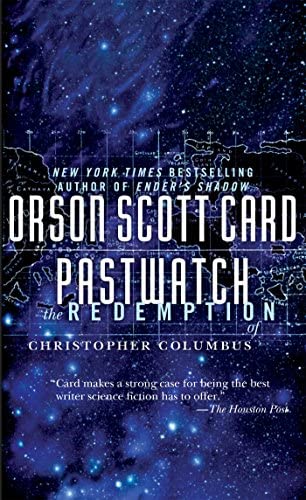Pastwatch / Global catastrophe?

And the start to the blog comes with the most unsavory of topics imaginable: the destruction of all humanity. I figured I’d just get right down to it! It’s important, I think, not to confuse pessimism with realism, so here is my realistic take on what threatens us. It’s long, but I think it will be worth your while – feel free to comment on it and engage in discussion.
I just finished reading Pastwatch: The Redemption of Christopher Columbus by Orson Scott Card – a pretty awesome book. It’s set in the future, after some unspeakable human tragedies that have left our world with very few people who vow to never destroy the planet like we have. The Amazon is now a desert and is being reforested, and sustainable food is finally being developed. They develop the ability to see into the past and begin to learn about the horrors of slavery and human injustice. Once they discover they can change the past, they begin to consider thwarting Christopher Columbus’ discovery of America in the hopes that this would ameliorate the pains of slavery.
There’s more to it and I will leave aside the question of changing the past to turn to the possibility of a global catastrophe. (a topic on which I am very much a layperson, and have no specialized knowledge on whatsoever. So sue me.) This topic is particularly hard for us to broach in international dialogue with any degree of seriousness, for two fundamental reasons of human psychology:
- It is extremely hard to gain consensus on something that is not plainly evident for all to see. Nobody wants to be the person leading the country to ward off a threat that has not yet fully shown its pain. And if anybody did, the country would not follow. The resources necessary to ward off a crisis will not be used if it is possible to doubt the crisis.
If an all-seeing country were to effectively ward off a crisis, the result would be no crisis and a growing consensus that this “visionary behavior” was, in fact, unnecessary. - If a global catastrophe is coming, we are all seriously fucked. And we couldn’t avert the crisis even if we tried because we would have to get everyone else on board, which we can’t! (see reason 1.) So why even think about it or talk about it? We move to ignorant optimism and a blind faith in “human ingenuity” to save us from whatever comes. With the rate of technological progress anything is possible, but it’s still likely that we won’t be able to get ourselves out of a pickle.
The Crisis
Where would it come from? A few thoughts, in my order of importance:

-
Water shortage. (from World Water Forum) We are already seeing the beginnings of this process. More than 1/6 of the world’s population lack access to safe drinking water, and more than 2/6 of the population lacks adequate sanitation (that’s about 2,600,000,000 people.) Many more people are on the threshold of inclusion in those statistics. With our population growing and humans needing more water, even less and less will be available to grow crops.
In addition to affecting humanity as a whole, the uneven distribution of clean water and the fact that over 260 river basins are shared between countries suggests that without serious diplomacy, there will be serious conflict.
Solutions? Wastewater treatment and desalination are extremely expensive, requiring mass amounts of energy (see energy crisis, below) – there is a possibility that technology may save us with this one, bringing cheap, energy-efficient wastewater treatment options. What makes this a theoretically solvable problem is that water is completely recyclable and automatically renewable. Even if it is mixed with acid, sitting in swamps, or salty in the ocean, we are still assured that it will be sitting there, and as soon as we can discover how to purify it, it is ours for the drinking.
- Food shortage. (from Time article and Telegraph article and Global Research article)It’s already happening, no doubt about it. Over three billion of the world’s population is malnourished in nutrients and vitamins. In just one year the price of wheat has risen by 2.5x, and the price of rice tripled. 24 people have been killed in Cameroon in food riots since February, and there have been food riots in at least eight other countries.
The cause of the shortages is a matter of differing perspectives, but a few common trends emerge. Our diversion of crops to biofuels has sucked up the supply and driven the price sky high (up to 38% of corn is now used for ethanol). Another common notion, advanced by Bush, is that Asia’s increasing demand for meat is causing the rise in demand; a leaked G8 report disputes this claim and blames biofuels. Climate change is a major factor – a new climate is rarely good for growing crops. Much of the world is in a drought (see water shortage above).
In a perfect world, food production would be a simple equation, with the maximum amount of healthy food that can be produced sustainably on one side, and the number of people in the world on the other. This equation reveals obvious problems:
a. plenty of the food produced is not healthy – the processing of foods to make them last long enough for distribution can rob them of nutrients. It has been shown that today’s vegetables have between 5% and 40% less nutrients than they used to.
b. food production is not necessarily sustainable – crop rotation and careful treatment of the soil is sustainable. massive tracts of one crop with no treatment of the soil kills food production
c. this is not a perfect world – there’s no way we could imagine a world where nobody ate better than anybody else. If we all became vegetarians that would help a great deal – could it ever happen?So if we were to produce enough food for everyone alive to eat to a level of health, how many farmers would we need? How much gas would we need for transportation?
Solutions? Apparently so, for now. No easy solutions, but solutions – in the long term, less meat consumption and more global conceptions of food distribution. But if we can’t feed the world, it won’t stop babies from being born. It will stop them from eating, growing, and surviving. Not a very fun way to learn the limits of our food production capacity.
- Energy crisis. There is little I need to say about this – it’s been covered daily in such a detailed level from every conceivable angle. Whether it is slowly or quickly, we are running out of oil and must find the next best solution to power our societies. And it would be nice if we figure out how to do it before we become so desperate that we ravage our forests and other natural resources to get the last hard-to-reach drops.
Solutions? Energy extraction is a human process and energy prices affect us quickly. Energy packs a huge punch to large companies’ bottom lines, so it’s the issue here that most affects the people who can do something about it. In my mind, the question is related to the price of oil over the next century. If it rises quickly enough and actual reserves are available long enough, it becomes economically feasible to research and adopt new technology. I think without foresight and some short-term painful choices, we’re in for a world of hurt first.
- Other crises. CO2 is rising to a previously unheard-of rate, and the ability of the planet’s rainforests to combat the increase is dwindling. In just a dozen years, frogs have gone from a common sight to a category of animal that is near extinction – experts theorize that they are particularly sensitive to the earth’s changes. Pollution of land, sea, and water is rampant.
Dead zones, oxygen-deprived patches of ocean clogged with plastic as far as the eye can see, take up 2% of our world’s oceans – an area the size of Michigan!
Is there a solution?
There is action we can take, ordered from easiest/most likely to hardest/least likely:
- Science. Barack Obama (bless his heart) is the first world leader to really nail this down. We need to throw all the money we can into solving all these problems. Human ingenuity is the least painful way to solve the problems, but it’s only going to work if we can really and truly transform ourselves and the way we operate. Incremental change would appease, but long-term not solve these issues until it would be too late.
- Conservation. Eat less, use less, travel less. Drastically less. Market forces will be (already are) pushing this conservation on us, but not quickly enough.
- Locally-based society. It’s not palatable, but saving cross-country and international travel for lightwaves would lift a tremendous strain on the energy resources of this world. I’m not a fan of what globalization has done to the developing world’s priorities. In a world where farmers are selling their tools in order to eat, something is wrong. Taking advantage of globalization to acquire healthy food and to contribute meaningfully to this world is a process reserved for the rich. I don’t know if there is a solution that allows us to remain an open, global community while allowing local groups to focus on improving their societies and moving at the pace they choose.
- Population control. Less people means less mouths to feed, less crowding for resources, less pollution. Our current way of life is clearly unsustainable – maybe we can alter our technology to make it sustainable, but I would be willing to take a bet that to live in a sustainable way for millennia, we’d only be able to support at most a quarter of our population, if that.
- Shift in priorities. This one you will not like. It’s not popular to talk about, but it’s the truth. After a certain point, the older you are the harder it is to keep you alive and the less you produce for society. In developed countries, we are extending peoples’ lives by decades through the use of intense, tremendous resources. I don’t see this being sustainable: as we progress we will only discover more treatments and tests to extend life. If our available resources continue to squeeze us, how can we in good conscience extend some peoples’ lives at the cost of keeping others malnourished for their entire lifetimes?
Easy to say for me, who at 23 is early on in my life cycle. This process isn’t going to be discussed except in vague complaints about Medicare being broken and the rising cost of Universal Healthcare. We will keep elderly care for as long as we can, but you had best believe it will be cut when and if it is needed–without fanfare or acknowledgement. Market forces are great for something like that.
Regardless of whether all of these crises will come to bear, it is clear that we are besieged by new challenge.
Ours is the first generation that can acknowledge and quantify the problems so clearly. And in acknowledging these problems, we have made ourselves responsible for their solutions.
Ours is the first generation that has the global awareness to see the world as the living organism it is.
And ours may be the last generation that has a chance to do something before it is really to late.
We need to wake up. I hope we’re up to the challenge.
